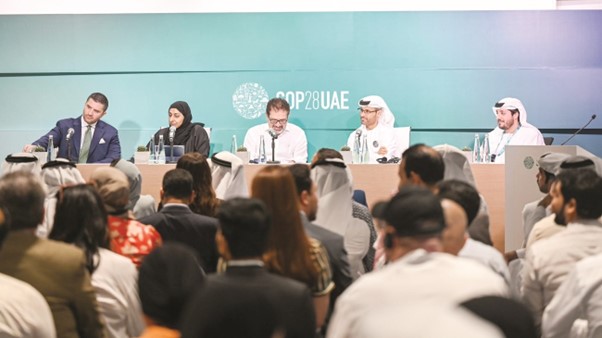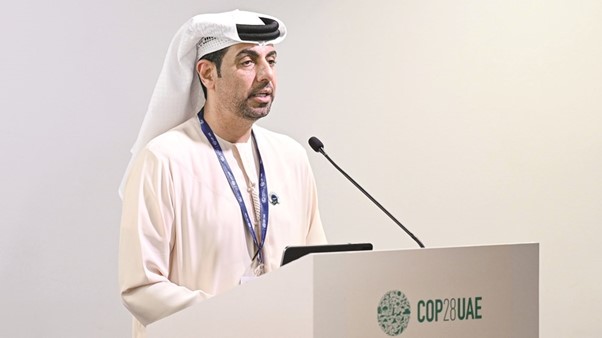TRENDS Research and Advisory, in partnership with Moharram and Partners for Public Policy and Strategic Communication, organized a symposium titled “Sustainable Cities: The New Generation of Smart Cities” on 6 December 2023 at the Media Center, COP28.
The symposium was attended by experts and specialists in developmental planning, smart technologies, and advanced technology. Among them were Jan Vapaavuori, President of the Finnish Olympic Committee and former Minister of Economy and Housing in Finland, Dr. Sherif El-Diwany, Swiss expert in development planning and co-founder and Managing Director of MGM Climate Business Developers, and H.E. Dr. Mohamed Al-Kuwaiti, Head of Cyber Security for the UAE Government.
The symposium commenced with Jan Vapaavuori discussing the new generation of sustainable smart cities and Finland’s pioneering experience in sustainable smart cities, particularly focusing on Helsinki. He explained that for smart cities to transform into sustainable communities, there is a need to work on resourcefulness, diversity, and support. He considered smart cities the right path toward sustainable development, as they are resilient to climate change and challenges in the coming decades since they rely on holistic sustainable development and continuously update strategic and regulatory frameworks. Vapaavuori emphasized that technology should be prioritized to improve people’s quality of life, with the focus not solely on the quantity of technology but on how it is utilized.
The President of the Finnish Olympic Committee further elaborated that smart cities are innovative communities requiring healthy cooperation and competitiveness, with a focus on enhancing their economic, social, and environmental aspects during both establishment and development.
Dr. Sherif El-Diwany stated that resilience is the key feature sought by all urban leaders in achieving urban sustainability in the 21st century. He emphasized that smart cities are based on the principles of participation and contribution between governments and individuals to ensure their sustainability. Dr. El-Diwany urged governments worldwide to expedite and expand the implementation of smart city plans, which should be based on resilience and digital technology, considering these cities as a “lifeline” in the face of the climate change crisis.
Regarding the opportunities and challenges facing sustainable smart cities, especially in terms of cybersecurity threats, Dr. Mohamed Hamad Al-Kuwaiti emphasized that the UAE’s efforts aim to ensure cybersecurity for communities and address all vulnerabilities through advanced technological security measures. He highlighted that resilience is crucial for overcoming security challenges and that cybersecurity serves as a vigilant guardian for smart city development initiatives.
Dr. Al-Kuwaiti explained that there are several mechanisms and strategies that can mitigate cybersecurity risks and protect smart city systems. These include building robust and continuously updated security systems, as well as enhancing security awareness among those working in smart cities.
Following that, Selim Eddé, Director of Government Affairs and Public Policy – Google Cloud, MENA, discussed Google Cloud’s experience in data protection and developing security systems for governments, communities, and individuals. He added that creating secure smart cities faces the challenge of expansion opportunities, making cooperative partnerships and integration between the public and private sectors essential to capitalize on these opportunities for sustainable smart city development.
Eddé stated that the sustainability of smart cities requires leveraging artificial intelligence and 3D technology, in addition to working on physical infrastructure. This includes enabling secure systems, especially artificial intelligence systems capable of overcoming security challenges, for communities to live in sustainable environments.
News link:
Video





